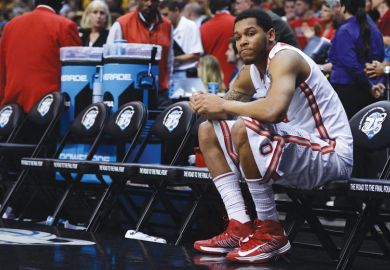A new agreement on US student-athlete salaries could create a future in which a few dozen high-profile campuses boast professional-style football and basketball teams, experts believe, with hundreds of other institutions facing declines in both revenue and valuable attention.
The National Collegiate Athletics Association (NCAA) has agreed on behalf of its thousand-plus institutional members to settle a major lawsuit by creating a revenue-sharing plan under which schools would directly pay their student-athletes.
This proposed settlement – made in the case of Grant House, a former swimmer at Arizona State University – still needs the approval of a federal judge and clearer answers to a complicated set of questions about implementation and accompanying legalities.
But fundamental change looks inevitable, and the result of the agreement, according to Mit Winter, an attorney specialising in collegiate sports law, is that a small subset of the nation’s sports-rich institutions – despite paying student-athlete salaries – will reap even more value from the overall sports enterprise, while the 1,100 other colleges and universities will lose much of what they’re getting, widening a resource gap that already exists.
The proposed settlement involving Mr House incorporates two similar cases and would require institutions with the biggest sports programmes to pay $2.8 billion (£2.2 million) in damages and then set aside about $20 million apiece each year to pay their athletes going forward.
Michael LeRoy, a professor of labour and employment relations at the University of Illinois, said the biggest US professional leagues have found that 30 teams is roughly the optimal number, and that’s likely the size that the top-tier college football and basketball operations will ultimately embrace.
That means a process to eliminate the teams “that aren’t quite as attractive, and make every game a media bonanza”, Professor LeRoy said.
Given the NCAA currently distributes its revenues in ways that disproportionately benefit the institutions with smaller operations that help fill out the standings, most US colleges and universities stand to lose ground, Professor LeRoy said. “All of those schools – 1,100 of them – are going to suffer financially as a result of this settlement,” agreed Andrew Zimbalist, a professor of economics at Smith College.
These same institutions will be hit by the knock-on impact on recruitment, especially at a time of steady population declines in many US states.
“When you hit the demographic cliff,” said William Berry, a professor of law at the University of Mississippi, “it becomes even more important to have your institution have this incessant advertising every Saturday.”
US universities have long opposed paying salaries for reasons of both academic philosophy and actual costs. They now must do more than just get past that psychological barrier, the experts said, and think hard about the best way to structure compensation for their student-athletes. Possible ideas, some said, might include devising a system that maintains competitive balance across schools by paying salaries from a common pool, and putting a priority on using the money to better ensure long-term student-athlete health and well-being.
Universities also should find ways to more regularly award academic credit for sports-related accomplishments, as is done routinely in many other professional fields, said Matthew Mitten, a professor of law at Marquette University and executive director of the National Sports Law Institute.
Register to continue
Why register?
- Registration is free and only takes a moment
- Once registered, you can read 3 articles a month
- Sign up for our newsletter
Subscribe
Or subscribe for unlimited access to:
- Unlimited access to news, views, insights & reviews
- Digital editions
- Digital access to THE’s university and college rankings analysis
Already registered or a current subscriber?








